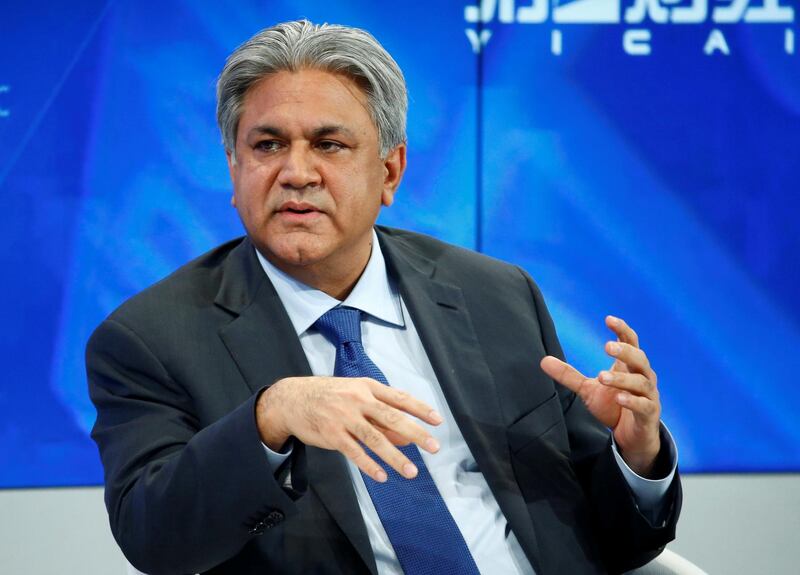Over the course of 16 years, Dubai-based Abraaj Group became the Middle East's biggest private-equity dealmaker and one of the most significant emerging-market investors. The company's shocking collapse last year took only four months, roiling markets and raising concerns about corporate governance. Prospective investors are circling the company's funds as liquidators seek to settle around $1 billion (Dh3.67bn) in debt.
Here is what happened:
On April 11, two former top Abraaj executives were arrested on US charges of defrauding investors. The circle of investigation has widened to the other side of the Atlantic in another dramatic turn for the embattled company.
Founder Arif Naqvi broke his silence in an exclusive interview with The National days before his arrest. Mr Naqvi said that nobody had a "bad word to say about him" and he was working with liquidators to "solve their issues" as they tried to assess if anything that had happened was "not normal".
The National breaks down some of the issues:
Read More
[ Exclusive interview: Arif Naqvi breaks his silence ]
[ Dubai regulator took 'appropriate' measures against Abraaj ]
[ Explainer: What now for Abraaj Group? ]
Where did the two business partners get arrested?
Founder Mr Naqvi was arrested last week in the UK and is awaiting possible extradition to the US. Mustafa Abdel-Wadood, a former managing partner, was held on Thursday after arriving in New York with his wife and son to look at colleges and remains in a federal lock-up.
What are the charges?
In brief indictments revealed on Thursday, US federal prosecutors allege that from about 2014 until Abraaj's collapse, Mr Naqvi and Mr Abdel-Wadood lied about the performance of Abraaj's funds, inflating their value by more than half a billion dollars, Reuters reported. Prosecutors also said the business partners misappropriated "at least hundreds of millions" of investor funds, either to disguise liquidity shortfalls, for their personal benefit or that of their associates.
Separate related civil charges brought forward by the US Securities and Exchange Commission allege that Abraaj Investment Management and Mr Naqvi defrauded the Abraaj Growth Markets Health Fund and US investors by misusing more than $230 million of fund money, according to the complaint filed on Thursday at a US District Court in New York.
What have their lawyers said so far?
Mr Abdel-Wadood's lawyer Benjamin Brafman – who has represented high-profile clients including IMF managing director Dominique Strauss-Kahn, American singer Sean Combs and Harvey Weinstein – declined to comment when contacted by The National.
A statement from Mr Naqvi's external PR firm said Mr Naqvi maintains his innocence in relation to the charges and fully expects to be cleared. It added the executive has been "working tirelessly" for nearly a year since the start of provisional liquidation to maximise returns for Abraaj's creditors.
What next for them?
Mr Naqvi appeared in a London court on Thursday and was placed in custody to appear again on April 18 at Westminster Magistrates Court for the extradition case via a video link, a court official told Reuters on Friday. Mr Abdel-Wadood is being held in a US federal prison after a brief court appearance.
What does the local regulator have to say about the Abraaj case?
Dubai Financial Services Authority, the emirate's financial regulator, last week told The National it had taken "appropriate" measures against the Abraaj Group, but communication was lacking and there needs to be tighter scrutiny of high-risk entities. The DFSA, which regulates 500 companies registered at the Dubai International Financial Centre free zone, is preparing to introduce tougher policies with regard to corporate transparency and risk management. Any company that fails to satisfy the toughened controls could be struck out or forced to amend its business model.
How has Mr Naqvi responded to the mounting allegations against him?
Mr Naqvi sought to defend his personal reputation few days before his arrest in London claiming that nobody had a "bad word to say about him" despite the collapse of his multibillion-dollar private equity fund.
What other charges does Mr Naqvi face?
Sharjah airline Air Arabia said in January it filed a misdemeanour case against Mr Naqvi, becoming the first publicly-listed company to start legal proceedings against the Abraaj founder in relation to his company's collapse. The airline's legal action followed arbitration proceedings in July. Air Arabia, which has a market value of approximately Dh4.8bn, disclosed in June it had an exposure of $336m to Abraaj through funds and short-term loans, making it among companies with the biggest exposure to the group.
Separately, Mr Naqvi was charged in the UAE in a $217m bounced-cheque case, which was settled after the court sentenced him to three years in prison. Mr Naqvi was out of the country at the time.
How did Abraaj unravel?
Listen to our Business extra podcast where associate editor-in-chief, Mustafa Alrawi, discusses Abraaj's fall from grace.







